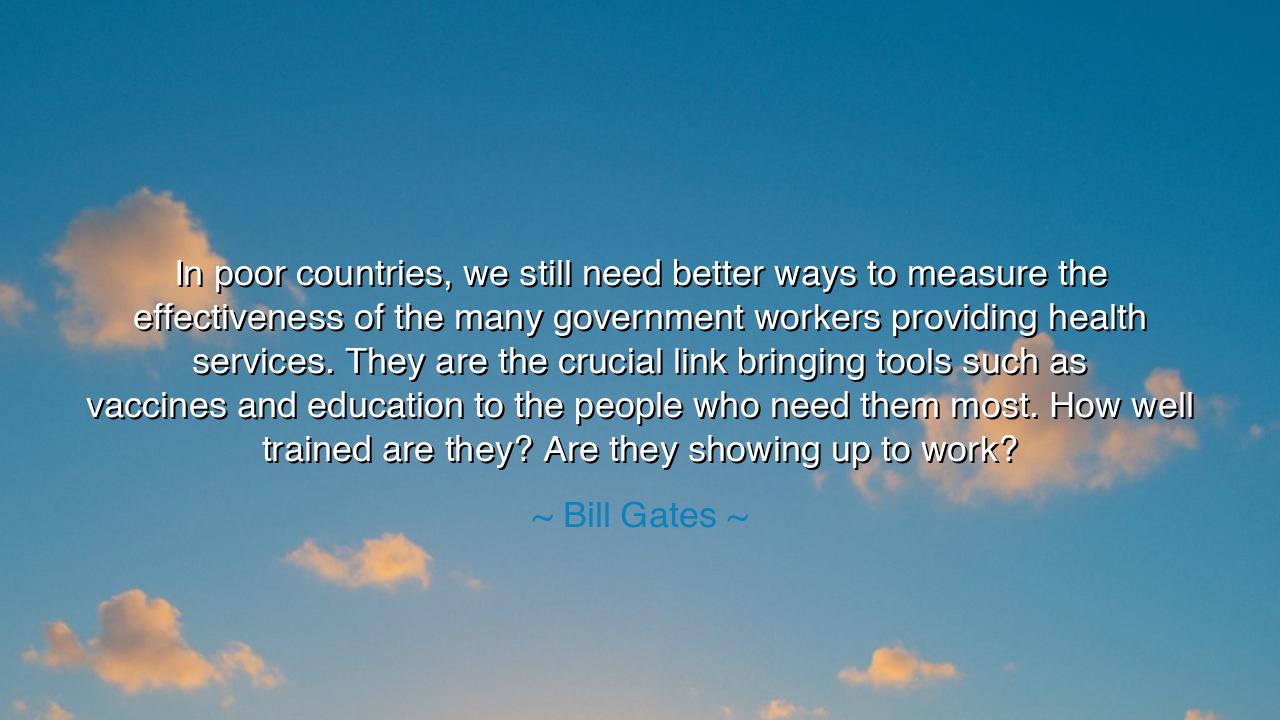
In poor countries, we still need better ways to measure the
In poor countries, we still need better ways to measure the effectiveness of the many government workers providing health services. They are the crucial link bringing tools such as vaccines and education to the people who need them most. How well trained are they? Are they showing up to work?






"In poor countries, we still need better ways to measure the effectiveness of the many government workers providing health services. They are the crucial link bringing tools such as vaccines and education to the people who need them most. How well trained are they? Are they showing up to work?" – Bill Gates
These words from Bill Gates arise not from a philosopher’s pen, but from the mind of a man who has seen the struggles of nations firsthand. Yet their tone carries the gravity of timeless wisdom. In this quote, Gates reminds us that the strength of a nation’s health is not found in its wealth or its technology, but in the hearts and hands of those who serve its people. The poorest countries often possess the greatest treasures of potential, yet without accountability, training, and presence, even the best tools—vaccines, medicines, education—remain useless. His statement is not merely a reflection on global health, but a profound meditation on responsibility and human effort.
The origin of this quote lies in Gates’s work with the Bill & Melinda Gates Foundation, whose mission has long been to fight disease and poverty around the world. After years of investing billions into vaccines, education, and sanitation, Gates learned that even the most powerful solutions fail when the system beneath them falters. In many developing nations, governments employ vast networks of public health workers—nurses, teachers, field officers—who are meant to carry the nation’s hope to its remotest corners. Yet often these workers are undertrained, underpaid, or absent altogether. Thus, Gates asks two haunting questions: “Are they showing up to work? How well trained are they?” These are not administrative queries; they are moral ones. For if the messenger fails, the message of progress never reaches those who need it most.
The meaning of his statement extends beyond medicine. Gates is teaching that institutions rise and fall on the integrity of individuals. Grand policies and international aid can build roads, schools, and hospitals—but they cannot make a man care. They cannot compel a heart to serve. The health worker in a small African village, walking miles to vaccinate a child, embodies more power than all the bureaucrats in distant capitals. Thus, Gates’s wisdom is both practical and spiritual: true change does not flow from wealth, but from commitment, skill, and presence. The failure of governance is not only a failure of structure—it is a failure of soul.
Consider the example of Nigeria’s battle against polio. For decades, the disease lingered not because the vaccine was ineffective, but because the chain of delivery was broken. Health workers failed to reach remote villages; misinformation spread; oversight collapsed. But when leaders began measuring performance, ensuring that each worker visited every community, and rewarding dedication, miracles followed. Within years, polio was nearly eradicated. This triumph was not technological—it was human. The same vaccines that once failed now succeeded because accountability and compassion replaced negligence and apathy.
Gates’s words thus echo the eternal truth known to every civilization: that systems are only as strong as the people who sustain them. A government can design programs and promise reforms, but without vigilant stewards, its efforts dissolve into dust. Like the ancient builders who carved temples stone by stone, progress is forged not by decree, but by discipline. The “crucial link” Gates speaks of is the living bridge between policy and people—those humble servants whose daily labor makes the difference between sickness and health, ignorance and knowledge, despair and hope.
Yet within his quote lies a warning, too. Without proper measurement—without truth—good intentions can decay into complacency. Gates calls upon the rulers and citizens of every nation to see clearly, to count honestly, to demand excellence. For compassion without accountability is sentiment; but compassion with integrity is salvation. The great moral of his message is that we cannot improve what we refuse to examine. Progress demands the courage to measure, to question, to reform.
The lesson, then, is both ancient and modern: do not worship the tool—honor the craftsman. A vaccine, a textbook, a hospital—these are only instruments. The true work of healing and uplifting belongs to the hearts that wield them with purpose. In every nation, rich or poor, we must build not only systems, but character—a culture where service is sacred, and every worker, from the grand physician to the village nurse, is held to the flame of duty.
So let Gates’s words endure as a call to conscience. Let them remind us that progress begins not with wealth, but with wisdom; not with power, but with presence. For the true measure of any government is not how much it promises, but how faithfully its servants deliver hope into the hands of the forgotten.






AAdministratorAdministrator
Welcome, honored guests. Please leave a comment, we will respond soon